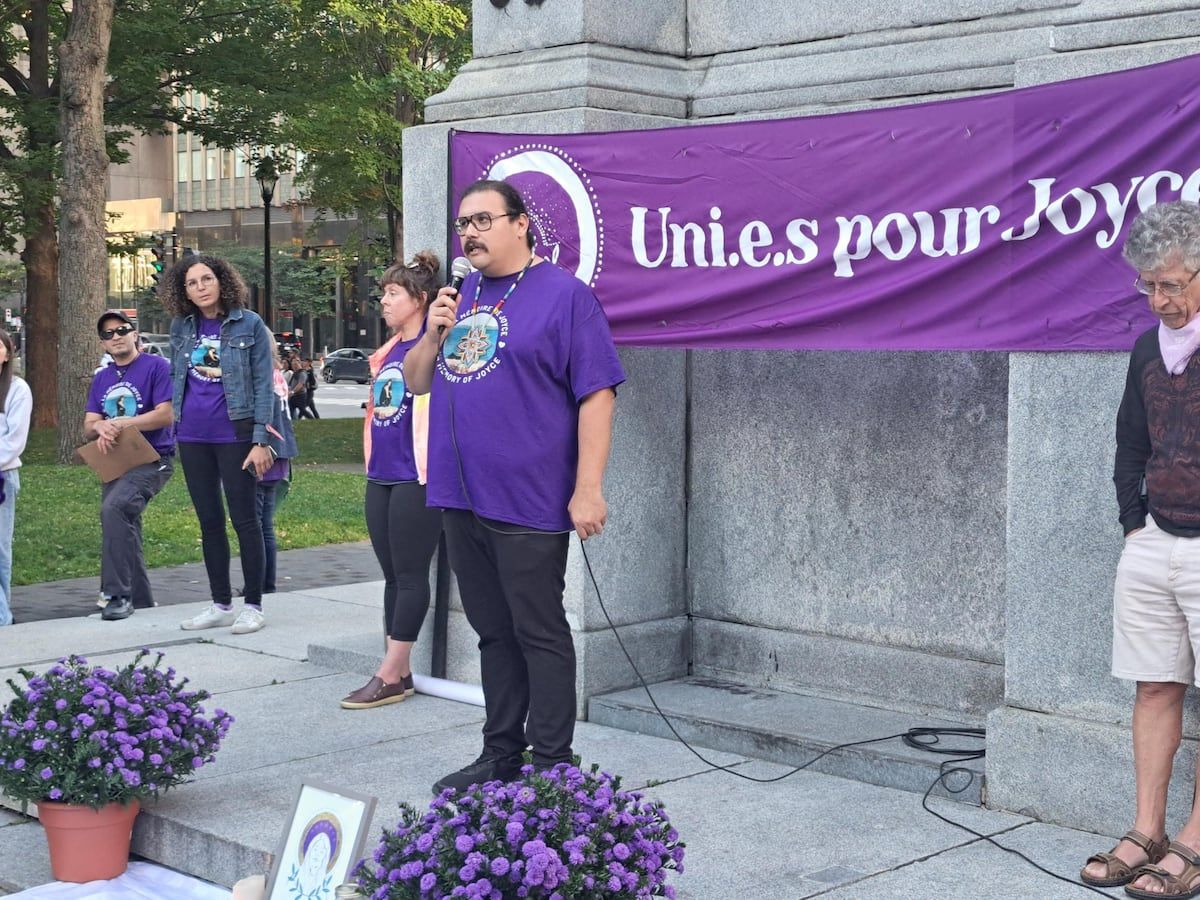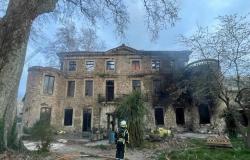Transportation had also been planned from Manawan and Wemotaci to the metropolis. Activists for the First Nations cause mingled with numerous activists wearing Palestinian scarves, as well as personalities like Sipi Flamand, chief of the Atikamekw Council of Manawan, and Ghislain Picard, chief of the Assembly of First Nations Quebec -Labrador (APNQL).
Around 300 people gathered Saturday evening at Place du Canada in Montreal to perpetuate the memory of Joyce Echaquan. (Éric Faucher/Le Nouvelliste)
Organized by the Let’s Take Care of Social Justice collective, in collaboration with the Office of the Joyce Principle, the gathering was intended to be both commemorative and protesting. Participants were invited to light candles in memory of the deceased whose story marked the province in 2020.
Joyce’s Principle
Following the death of Joyce Echaquan within a health establishment, public consultations led to the creation of the Joyce Principle, which “aims to guarantee all Aboriginal people a right of equitable access, without any discrimination, to all social and health services, as well as the right to enjoy the highest possible standard of physical, mental, emotional and spiritual health.
This implies, among other things, “recognition and respect for traditional and living knowledge and knowledge of indigenous people in matters of health”, but also recognition of systemic racism – something the Legault government stubbornly refuses to do.
“Four years ago, Joyce Echaquan recorded her last moments of distress and her voice still accompanies us today. His voice is a call to action […] to end systemic racism against Indigenous people, to end medical colonialism and for justice.”
— Nazila Bettache, spokesperson for the Let’s Take Care of Social Justice committee
“This is the fourth year. I won’t say that nothing has changed. Obviously, things change. The government continues to move forward, but not in the same direction as us. In this sense, it is really important for us to show that we are united and that we will continue to work hard together to obtain what we ask for,” indicates Doreen Petiquay Barthold.
“Joyce is as important as she was four years ago, so we want to show our support to her family and her community,” continues the person who is responsible for communications and social networks at the Joyce Principle Office, based in Manawan.
The group Powwow Rangers dedicated a song to Joyce Echaquan. (Éric Faucher/Le Nouvelliste)
“Four years later, the emotions are still present in relation to the sadness, but also to the anger in relation to this tragedy”, underlines for his part Sipi Flamand, head of the Atikamekw Council of Manawan, the community from which Joyce Echaquan.
“I would say that there is still a certain fear regarding the services offered by hospital centers. There is still work to be done, especially with the Joliette hospital, but also with the Quebec government to be able to ensure a certain confidence on the part of the Atikamekw.”
Spotlight on systemic racism
The speeches delivered on site were unanimous regarding the Coalition Avenir Québec (CAQ) government and its refusal to recognize systemic racism. On several occasions, Prime Minister François Legault and the Minister responsible for Relations with First Nations and Inuit, Ian Lafrenière, were questioned.
“We are still at the same stage in relation to the relations that we have with the government of Quebec, especially in connection with the discourse that it carries, that it defends, of not wanting to recognize systemic racism when it is a reality that we experience daily when we benefit from services in hospitals or many other Quebec public services,” lamented Sipi Flamand.

Sipi Flamand, chief of the Atikamekw Council of Manawan. (Éric Faucher/Le Nouvelliste)
The latter also delivered a particularly inspired and demanding speech on the current situation and the history of the indigenous communities of the province. He began by pointing out that he was on unceded territory. “A territory that has been exploited and stolen without ever recognizing the sovereignty of the people who have lived there for millennia,” he said.
“What Joyce suffered is unacceptable. This is not an accident, this is not a simple dysfunction, it is the direct result of systemic racism rooted in the institutions that were built to oppress us, to dispossess us and to silence us. »
— Sipi Flamand, chief of the Atikamekw Council of Manawan
“The Indian Actreservation, Indian residential schools, all this is part of a colonial strategy, a war declared against the first peoples to erase us, reduce us to numbers, to stereotypes. But we are still here. We are standing and will not be silent,” said the leader of the Manawan community.
“Today, this same racism is expressed in every aspect of our daily lives. Our lands are plundered, our children are torn from their culture, our languages are threatened and in hospitals, like Joyce, we are treated like second-class citizens,” he continued. “This must stop now. The Joyce Principle is not a simple recommendation, it is a moral imperative.”
“Systemic racism is real. He kills and he continues to kill. What is Prime Minister Legault waiting for to recognize this reality? How many more Joyce Echaquans do we need before the State takes its responsibilities?








